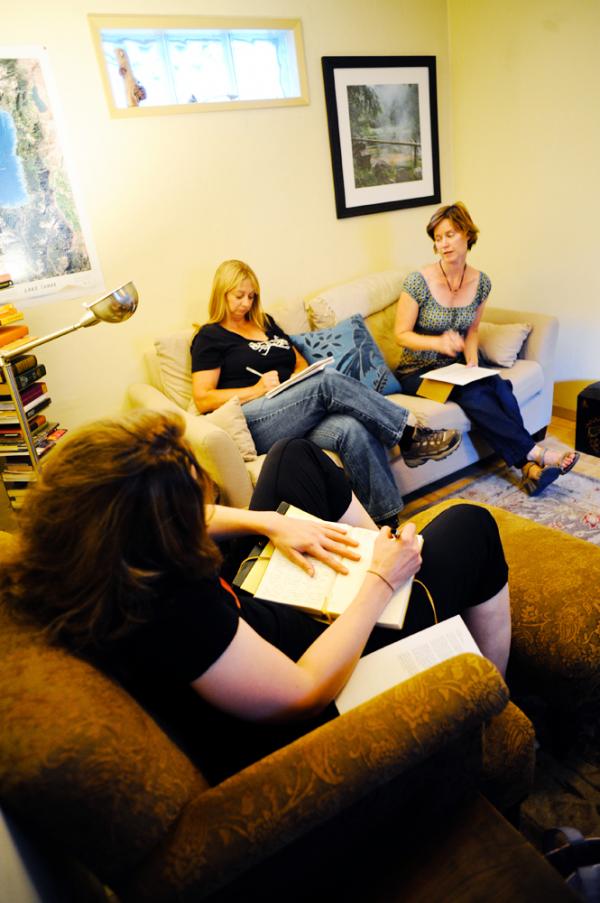Chris Millis presented a dynamic and powerful talk on what makes good story and especially a good screenplay. He played excerpts from movies that model this structure such as Moonstruck, Star Wars, Boogie Nights, Ali, and his own hilarious anti-hero film Small Apartments. Here are my notes from his talk. I find that rewriting my notes into a post helps me assimilate the knowledge into my own work.
What follows are Chris' talking points:
Chris started with setting up some context on story by quoting Toni Morrison, my newest hero (as I've just finished reading and teaching The Bluest Eye), from her essay The Site ofMemory.
Excerpt from The Site of Memory – Toni Morrison:
I consider that my single gravest responsibility (in spite of that magic) is not to lie. When I hear someone say, "Truth is stranger than fiction," I think that old chestnut is truer than we know, because it doesn't say that truth is truer than fiction; just that it's stranger, meaning that it's odd. It may be excessive, it may be more interesting, but the important thing is that it's random - and fiction is not random. Therefore the crucial distinction for me is not the difference between fact and fiction, but the distinction between fact and truth. Because facts can exist without human intelligence, but truth cannot.
Humans need
story to reveal the meaning of our existence
Plot is
character revealed by action – Aristotle
Resources:
·
Syd
Field – Foundations of Screenwriting
·
Robert
McKee – Story
·
Blake
Snyder – Save the Cat
·
Creativity, Inc
·
Andrew
Stanton – TED talk on Story
·
The
Site of Memory – Toni Morrison essay
Average Screenplay
is 110 pages total
Act 1: 9-10
scenes (1-30 pages)
Presents thesis, Ordinary world
Act 2: (31-84)
(page 55 is the midpoint)
Strange new world, Presents anti-thesis
Act 3: 85-110
pp
Wisdom, Synthesis
More on Synthesis:
Hegel: The only way a battle could cease
between a thesis and an antithesis was through the construction of a synthesis
that would include elements from both sides and transcend the opposition, a
transcendent “third” that is a new entity in which both are included.
Jung: The individual is faced with the
necessity of recognizing and accepting what is different and strange as a part
of his own life, as a kind of ‘also-I’.
How the
subject has to recognize in the foreign power it fights the misrecognized part
of its own substance – reconciliation of the subject with its alienated
substance
We must see
the character at work/home/play – play includes some special skill that can
come to its full flowering – important in the synthesis
Movies as models of this structure:
- · Moonstruck
- · Star Wars
- · Small Apartments
- · Boogie Nights
- · Ali
- Toy Story (all of 'em)
Act 1:
Significance of opening image: metaphor of thesis
5 minutes into the movie: present a statement of theme, the
basis of all decisions and the bigger idea of the movie
“Save the
Cat” moments – you have to make people care – they need a problem they have to
solve
Catalyst – the inciting incident 12 minutes
in
Refusal of the call – individual vs. systemic problem, a
period of indecision – character must
leave Act 1 of their own accord, a decision is made!
·
Who
will be the sounding board?
·
Who
will be the mentor, supernatural aid?
Act 2: 25-30 minutes
·
Antithesis
is presented (about 10 scenes)
·
B-story
line begins (love story?)
·
The
promise of the premise is given to the viewer in first half of second act
·
Characters
bond and are tested, make friends and enemies
·
Introduce
a new character just before the midpoint (p 55) – often there is a reversal of
momentum here, tangible vs. spiritual goal conflict
Second half of Act 2: 9-10 scenes
o
Ideas
fail, desperation grows
o
Friends
abandon the hero
o
Consequences
from earlier actions happen
o
Walls
close in on hero (trash compactor in Star Wars)
o
All
is lost – p 75 – called the Death Beat just before end of Act 2
§ Also death of mentor, loss of
sounding board
§ Usually a “false” victory or defeat
here – rock bottom
·
At
75-78 minutes
·
Visualizing
moments – characters stare off into the distance, internal reflection, to go
inward
At the end of Act 2 – what am I going to do? Find the
courage to be the hammer, not the anvil – once this decision is made, it’s the breakaway from Act 2!
Act 3:
·
desire
for wisdom to be achieved
·
To
transcend opposition
·
A
triumph of integration and wholeness
·
Combine
knowledge and mistakes to succeed
One more thing: 5 final steps! Stack the odds against the hero and
make the ending surprising as well as inevitable
·
Urgency
- beat the ticking clock
·
Surprise
·
New
new plan
·
Crossing
return threshold
·
Climax
– falling with style
Coda? Denoument – not Deux ex machina!
If you have
a problem making your plot have what it takes for the audience to care, go back
to the beat right before the midpoint (at p 55) – find something there to be
addressed or assimilated or overcome in the climax
Final image – opposite of opening image?
Why write story?
·
Contribute
your own myth – make new mythologies!
·
You
get a little window to tell your stories – what will be your story?



























